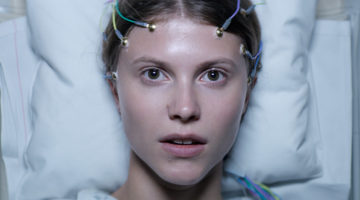Interview: Rebecca Hall and Craig Shilowich discuss CHRISTINE
Little is really known about Christine Chubbuck. In 1974, the American newscaster, just weeks shy of her 30th birthday, committed suicide live on television during an otherwise routine morning television newscast. This year brings us two films that explore her life, Christine and Kate Plays Christine (both premiered at the Sundance Film Festival earlier this year). As Ms. Chubbuck in Christine, British actress Rebecca Hall gives one of the year’s most memorable and searing performances, perfectly encapsulating a fearlessly ambitious yet deeply depressed young lady, a pioneer in her career. Hall describes Christine as “a film about sensationalism without being sensationalistic” and it is one of our favorites of the year.
Along with two other notable local journalists, we were blessed to have been given the opportunity to sit down with Hall and Christine screenwriter Craig Shilowich hours before the film’s Canadian premiere at the Toronto International Film Festival. The following are some of the prominent conversation highlights.
To quote from Hamilton, the typical females on screen “talk less, smile more”, yet Christine, thankfully, isn’t that type of role. The overarching theme in mainstream cinema is to not show representations of strong, flawed women. Craig, when you were pitching your screenplay, and Rebecca, when you were mulling the script, did you receive a lot of, “Yes, but…” pushback?
Craig Shilowich: Kind of, yeah! Yes.
Rebecca Hall: It’s really hard. It’s a tiny, independent movie and it took awhile to get funding. Even when I was attached to it, not that I’m saying that I’m so great, but it took a year of being attached before anyone was willing to take the risk to give it money. I do think there is this question of female likeability on screen all the time. I think Christine is a profoundly unlikeable character but a very loveable one, and that’s the kind of role that I’ve always wanted to play. Acting heroes like Robert de Niro have spent their career doing those roles but women don’t get the chance.
CS: Yes, it’s difficult, and it continues to be difficult. It’s a film that defies resolution and suggests a lot and it’s supposed to be a very clear portraiture of this person who refuses to be pinned down.
RH: It’s original.
CS: It’s radical though. People came up to me and said, “Well, what if you just considered having Christine do this instead?”
RH: And people also think, “Oh great, it’s a women at the center of the film but she’s not sexually viable and she doesn’t get saved by a man and she’s sort of weird. How are we supposed to respond to that?” It’s hard. Yet the people who do see it, do like it.
The power of the film is that it’s not necessarily about a broken character but it’s one where we see someone breaking. What sort of research was involved in understanding the nuances of Christine?
CS: Well the most interesting thing about her, to me, was that the least interesting thing to her is breaking. She wants to keep it together. So what attracted me to it was that I went through a very extended depressive episode in college, when I was 19 to 25. I was on and off medication, I took a break from school, I lived with my parents for a couple of years, it was a daily struggle to just get out of bed a lot of the time. How I wandered into that period of my life was such a mystery to me. I thought, “what did I do to get here? Was it my relationship with my parents? Was it going to New York before I was ready to? Was it substance abuse related?” It was this weird thing where I knew something weird was happening to me but I couldn’t make it go away. Then as seriously as I went into it, I came out of it. I got a girlfriend, I got into work, I worked in production and with money and I found that satisfying. Yet I couldn’t tell you which one of those things made it all okay. So when I came across Christine’s story, I thought, “what if you took work away from me and I didn’t have that? Or I didn’t have my relationship? Or what if I were a woman in the 1970s having to put up with what women had to put up with then?” In a way it was a personal exercise and I really felt for her. I wanted to do justice by her.
What sort of reaction have you received following screenings of the film? One would hope that, at the very least, it would open a healthy discussion regarding the stigma surrounding mental health.
RH: I had a lady actually who came up to me after Sundance, who I was very moved by. She was very upset and told me that she went through a breakdown and suffered greatly from depression. She said that she was incredibly grateful to have it portrayed accurately, and I found that very moving.
Christine is currently playing in Toronto at the TIFF Bell Lightbox.








